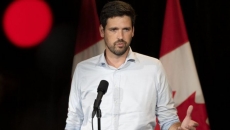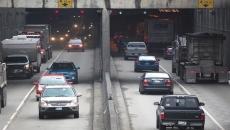Court documents filed in the case of a Pakistani man arrested in Quebec for an alleged plot to kill Jews in New York City reveal the RCMP didn't have enough evidence to hold him in Canada.
The RCMP arrested Muhammad Shahzeb Khan on Sept. 4 in Ormstown, Que., as he allegedly prepared to cross the nearby border into the United States.
U.S. officials have charged Khan, 20, with one count of attempting to provide material support and resources to a terrorist organization — the Islamic State — and they are seeking to have him extradited to stand trial in the Southern District of New York.
Authorities allege that Khan, a resident of Ontario who also went by Shahzeb Jadoon, intended to use "automatic and semi-automatic weapons" in a mass shooting in support of the Islamic State at a Jewish centre in Brooklyn around Oct. 7, the one-year anniversary of the Hamas attack on Israel.
The RCMP had grounds to arrest Khan based on information provided by the U.S. — but police feared they didn't have enough evidence to hold him in the country, according to an affidavit filed with Ontario Superior Court on Sept. 4. The affidavit was part of an application for a provisional arrest warrant to keep Khan detained on the U.S. extradition request.
Khan was living in Mississauga, Ont., according to court documents, and federal Immigration Minister Marc Miller has said the accused arrived in Canada in June 2023 on a student visa granted in May of that year.
RCMP in Quebec arrested Khan on Sept. 4 after their Ontario counterparts notified U.S. officials that he was planning to cross the border with the help of a human smuggler.
According to the affidavit, Khan was arrested on three terror-related charges: attempting to leave Canada to commit an offence for a terror group; participating in the activities of a terror group; and conspiracy to commit an offence by violating U.S. immigration law. However, the police didn't have enough evidence to keep him detained.
"The RCMP had grounds to arrested Khan on the information provided by the U.S. but they do not have enough evidence to keep Khan in custody," Det.-Const. Charlene Smith of the Toronto police said in the affidavit seeking the arrest warrant under the Extradition Act.
"If Khan is released, the RCMP do not know if he will continue on to the U.S. to commit the offences set out in this request."
Authorities feared that Khan was a flight risk with no ties to Canada and that if he fled to Pakistan, it would limit the United States' ability to extradite him.
"There are no charges pending against Khan in Canada and although we understand Canadian law enforcement is attempting to gather more evidence related to their arrest, Khan will be released shortly if those efforts are not fruitful," according to a Canadian Justice Department affidavit authorizing the request for an extradition-linked arrest warrant.
"If Khan were to flee to Pakistan, the United States would have limited ability to arrest and extradite him."
While the U.S has an extradition treaty with Pakistan, that country is not a "co-operative partner in extradition," according to the documents filed in the case.
U.S. officials said Khan allegedly began planning his attack in November 2023, the same time he allegedly started posting on social media and communicating with others on an encrypted messaging app about his support for ISIS; he also allegedly distributed propaganda and literature about the terror group.
Khan then began communicating with two undercover officers who posed as people willing to help him carry out his alleged attack. The accused allegedly implored the two officers to buy weapons for the plot.
During one communication, Khan noted, “if we succeed with our plan this would be the largest attack on U.S. soil since 9/11.”
He is not charged with any crimes in Canada for the time being, his Montreal attorney, Gaétan Bourassa, told reporters last Friday following a court hearing during which his extradition case was postponed until Dec. 6.
Under extradition rules, the U.S. has 60 days from the arrest to file evidence, and Canada has a further 30 days to allow the extradition or refuse it.






